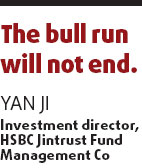Stock market fundamentals 'still strong'
Updated: 2008-02-12 09:13
SHANGHAI: The Chinese stock market has remained fundamentally strong despite the looming threat of a global economic recession and the battering it took over the past several weeks.
In fact, some analysts say, the sharp fall in A-share prices has made them increasingly attractive because their current prices reflect their true worth.
The benchmark Shanghai Composite Index (SCI) has dropped 16.6 percent, wiping out 5 trillion yuan ($700 billion) in market capitalization since the freefall began on January 21.
Finance leaders from the Group of Seven major economies said at the weekend that the crumbling US housing market had hurt the world economy and that conditions may worsen as debt-laden banks clamp down on credit.
European stocks dropped 1 percent in early trade yesterday but then recovered slightly.

But the Asian stock market took another battering yesterday because of the US economic slowdown. The Shanghai and Shenzhen bourses, however, were still closed for the Spring Festival holiday. They re-open tomorrow, and the Japanese stock market resumes trading today.
Despite the drop in stocks in Hong Kong, South Korea, Singapore, the Philippines and India, the mainland is very unlikely to experience a bear hug, analysts say.
The average price-to-earnings (P/E) ratio of 300 SCI stocks, which represent 60 percent of the total market capitalization, fell to 25 times based on this year's prospected profit earnings, down from 44.68 times in October when the market peaked. The profit earning calculation is based on widely estimated 30 percent growth of annual corporate earnings.
"The sharp falls have largely shaved off the speculative premium of many high-priced stocks, making them more attractive to value investors," Changjiang Securities analyst Zhang Fan says.
"We, however, cannot invest only by looking at P/E, the technical factor. We need to observe the whole investment environment," he warns.
Many mainland brokers corroborate Yan. Shenyin Wanguo Securities chief analyst Chen Li says the market is expected to remain volatile till next month. By that time most of the US financial institutions would have released their annual reports and the Chinese government announced its financial plan at the National People's Congress and the Chinese People's Political Consultative Conference annual sessions.
Globally, several large investment banks have reported losses because of the US subprime crisis.
The Swiss bank UBS has said it's likely to report a loss of $11.4 billion in the fourth quarter, far more than $9.8 billion, already reported by Citigroup and Merril Lynch.
"We don't know what will come next until all the financial institutions announce their annual reports," Chen says.
The bank's bad performance has heightened investors' worries over an impending US economic slump that could make stocks across the world fall sharply.
"But a US economic slump would only have negative impact on Chinese investors' sentiment, not on China's real economy," Yan says.
Also, analysts say a US recession is not expected to harm listed companies' profit growth, even from the aspect of exports.
Investment bank Goldman Sachs' figures show about 90 percent profits of A-share companies came from China's domestic market in 2006, with only 0.6 percent coming from the US and 0.4 percent from Europe.
Moreover, listed companies are expected to benefit from the unified tax system introduced in China from January 1 that cuts the statutory income tax from 33 percent to 25 percent for domestic firms.
Does that mean the Chinese economy is detached from the US economy? UBS Securities Asia senior economist Jonathan Anderson says: "China is a bit coupled with the US economy, but not enough to change the fundamental conclusion that China will still be well insulated at home in a US recession scenario."
|
|
|
||
|
||
|
|
|
|





